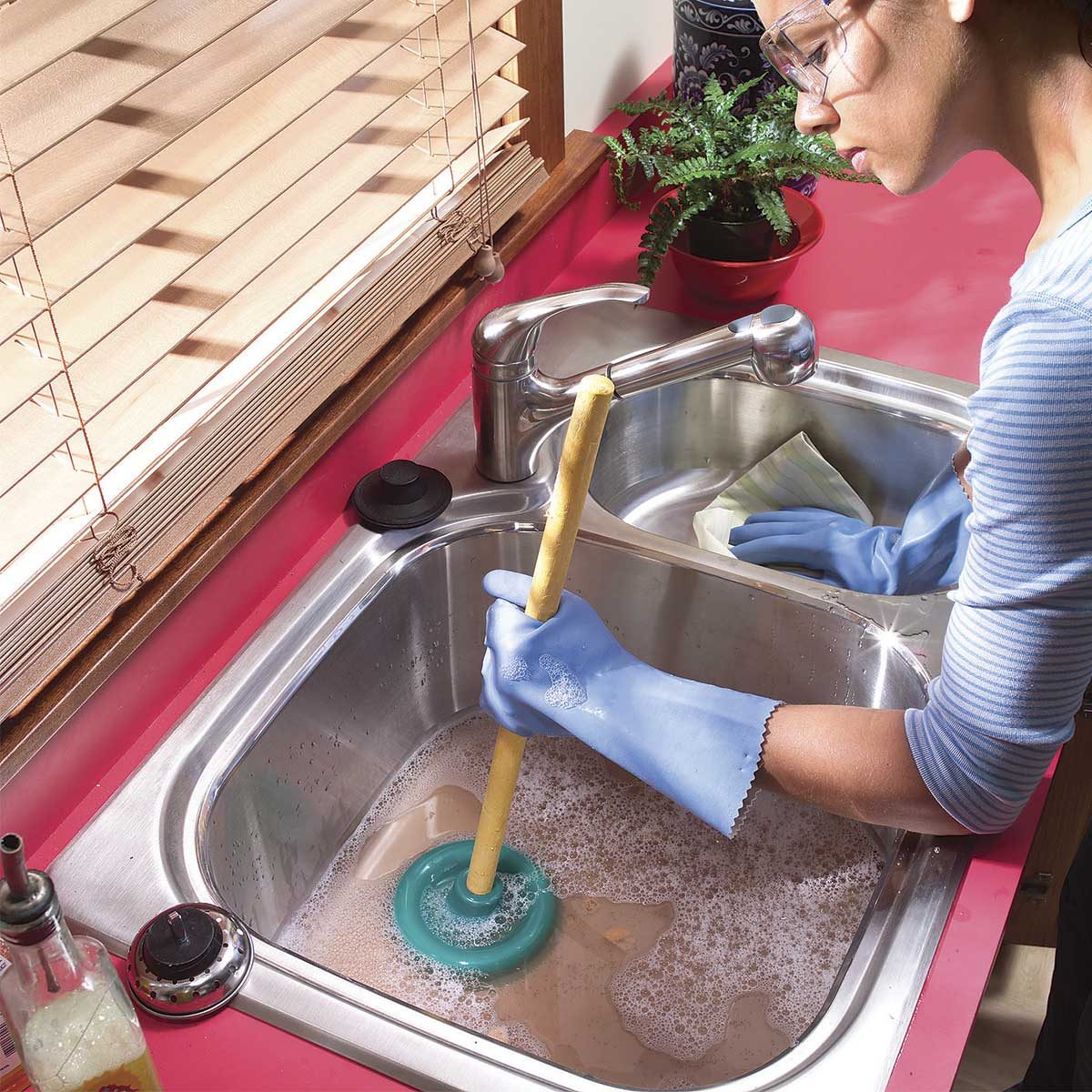We've discovered this post relating to Three Common Ways to Fix a Slow Drain down the page on the web and accepted it made sense to discuss it with you on this site.

Introduction
We've all existed: You're brushing your teeth or cleaning your hands, and you observe the water pooling in the sink. As opposed to promptly swirling down the tubes, it lingers, turning your once-refreshing early morning routine into a miniature swamp scene. A slow-draining sink isn't simply annoying; it's frequently an indication of larger pipes concerns hiding beneath the surface. Fortunately is that the majority of slow-draining sinks can be taken care of with a little knowledge, a few standard devices, and some patience. Ready to tackle this job head-on? Allow's roll up our sleeves and dive right in.
Recognizing the Causes of a Slow-Draining Sink
Prior to you begin poking around in your pipelines, it aids to recognize what could be triggering the downturn. Understanding the origin makes it easier to select the best fix.
Devices and Materials You'll Need
The right devices make all the difference. The good news is, you will not need a fully equipped plumbing technician's van to finish the job.
Step-by-Step Guide to Dealing With a Slow-Draining Sink
Now, let's get into the nitty-gritty. This step-by-step procedure will direct you with easy strategies to recover your sink's water drainage.
Action 1: Get Rid Of and Clean the Stopper
Often, the stopper (that small plug you push down to obstruct water) is the first perpetrator. Remove it carefully and clean off any type of hair or substance trapped around its base. Rinse it completely prior to placing it back in position.
Action 2: Use a Bettor to Dislodge Debris
Got that plunger all set? Placement it over the drainpipe and give it a few firm pumps. The idea is to produce suction that can loosen up any kind of clog. If you see littles debris floating up, you get on the ideal track.
Step 3: Try a Drainpipe Serpent or Wire Hanger
If the bettor does not do the trick, it's time to highlight the drain snake. Carefully feed it into the drain and twist as you go. You might really feel some resistance-- that's most likely the blockage. Keep twisting and drawing until you get rid of the blockage. If you don't have a drainpipe serpent, a corrected cord wall mount can operate in a pinch.
Tip 4: Use a Do It Yourself Drainpipe Cleanser
An all-natural cleaner made from cooking soft drink and vinegar can break down recurring gunk. Pour half a cup of baking soft drink right into the drainpipe, adhered to by half a mug of vinegar. Let it fizz for around 15 minutes, after that flush with warm water. This chain reaction typically does wonders for small blockages.
Step 5: Reconstruct and Check the Sink
Placed everything back with each other and run the tap. Does the water currently swirl away at a respectable speed? If yes, give on your own a pat on the back. Otherwise, do not anguish-- there are still a couple of even more tricks up your sleeve.
Important Devices for DIY Fixes
A plunger is your best starting factor. A small, sink-sized plunger creates suction that can dislodge minor obstructions. For more consistent clogs, a drain snake (occasionally called a plumbing technician's auger) functions wonders. A set of gloves, a flashlight, and maybe a pair of safety safety glasses are also convenient.
Suggested Cleaning Solutions
Moderate meal soap and warm water can assist break down greasy accumulation. A combination of cooking soda and vinegar is a reliable natural home remedy, and enzymatic cleaners use a more environment-friendly technique. Keep chemical drain cleansers as a last option, as they can be extreme on your pipelines.
Usual Offenders Behind Slow Drain
So, what's blocking things up? Normally, it's a combination of day-to-day debris-- believe hair, soap scum, tooth paste deposit, and remaining food particles. Gradually, these little bits gather and cling to the pipeline wall surfaces, progressively narrowing the flow and making it harder for water to go through. In some cases, natural resource from tough water can likewise contribute to the crud, creating the best tornado for stubborn obstructions.
When is it Time to Act?
If you discover the water draining pipes slower than typical, it's an excellent idea to step in quicker instead of later. Waiting as well long can result in finish blockages, unpleasant odors, or perhaps pipeline damage. If the water takes greater than a few seconds to clean out after switching off the faucet, consider it a red flag and get ready to put on your do it yourself hat.
Security First: Precautions and Prep work
Before you launch into unclogging setting, think of safety. You're handling potentially dirty water and particles, so slip on a set of handwear covers. If you're utilizing chemical cleaners, guarantee the room is well-ventilated and adhere to the guidelines on the label.
Safety Gear and Work Space Arrangement
Put down some old towels or rags around the sink area to catch sprinkles. Clear away any kind of things that might enter your means, like soap dispensers or toothbrush owners. Make certain you have good lights-- grab a flashlight if required.
Different Techniques for Stubborn Clogs
Not all blockages are created equivalent. If your sink still rejects to work together, take into consideration these alternative remedies.
Sodium Bicarbonate and Vinegar Technique
We currently discussed this, yet it deserves noting once again. This mild, green method is more secure than chemical cleaners and typically quite effective.
Chemical Drain Cleaners
Enzyme-based cleansers make use of all-natural bacteria to absorb raw material. They're an outstanding choice if you're wanting to avoid severe chemicals. Simply bear in mind, they might take a bit longer to function their magic.
Chemical Drain Cleaners: Advantages And Disadvantages
Chemical cleaners can blow up with challenging blockages quickly, but they're not without drawbacks. They can create heat and fumes, damage pipes if made use of excessively, and present ecological threats. Use them moderately, and constantly follow the instructions thoroughly.
Safety Nets to Keep Your Sink Flowing
Avoidance is the best remedy. By adopting a couple of basic behaviors, you can keep your sink from slowing down in the first place.
Regular Cleaning Up Behaviors
Wipe down the sink basin and component location routinely. Eliminate hair or food fragments before they have a chance to wash down the drainpipe.
Staying Clear Of Damaging Compounds Away
Hesitate before discarding coffee premises, oil, or coarse vegetable scraps down the sink. These wrongdoers cling to pipe walls, creating blockages gradually.
Regular Maintenance Checks
Set up a fast month-to-month examination. Run warm water through the sink for a few minutes, focusing on the circulation. If it appears slow, act fast before it ends up being a full-blown clog.
When to Call an Expert Plumbing Technician
Often, despite exactly how difficult you attempt, that clog simply won't move. That's when it's time to generate the pros.
Signs That Suggest an Extra Major Concern
If your sink drains slowly despite several efforts, or if you discover water supporting in other fixtures (like your shower or toilet), you may have a much more major plumbing problem lurking deeper in the system.
Balancing Do It Yourself Initiatives with Specialist Aid
While do it yourself can save you money and provide a sense of accomplishment, there's no embarassment in calling a specialist. An expert plumbing professional can assess your whole pipes setup, ensuring there's no underlying damages or long-lasting trouble that could cost you extra in the future.
Comparing Prices and Long-Term Solutions
Prior to choosing, think about the big picture. A cheap, quick fix could solve the problem temporarily, yet buying an extra irreversible remedy could conserve you money and stress and anxiety over time.
Considering the Costs of Do It Yourself vs. Specialist Fixes
DIY repairs usually set you back little more than the price of a plunger or a bottle of baking soda. Specialist services, on the other hand, included a price however may prevent repeated concerns and pricey repairs later.
Investing in Quality Fixtures and Upgrades
If your sink's design contributes to constant obstructions, it could be worth updating to higher-quality components or changing the plumbing layout. Consider this an investment in your home's performance and convenience.
Verdict
A slow-draining sink can seem like a minor irritation, yet it's usually an indication that your plumbing requires a little TLC. By comprehending the root causes, employing the right tools and techniques, and committing to easy preventive measures, you can maintain your sink streaming freely. And when all else stops working, never think twice to hire a specialist-- your home's plumbing is worth the financial investment in care and upkeep.
Three Common Ways to Fix a Slow Drain
Baking Soda Method
Boil a full pot of water. Measure out cup of baking soda and pour it down the drain. Then take cup of the magical cleansing substance known as white vinegar and drop that down there too. Allow the mixture to fizz in the drain for five minutes as the vinegar and baking soda combine. Now dump in that whole pot of boiling water. This combination of cleaning substances should clear out anything that is causing your sink to drain slowly. If it doesn t...
Zip-It
If the baking soda method doesn t clear out your drain, it may be because a significant amount of hair and/or other debris has collected there and you need to remove it. Purchase a Zip-It tool at any home improvement or hardware store and insert it into your drain. It will catch any collected hair or debris that s blocking the flow of water. Pull it out. If it s got a big clump of hair, etc. on the end, you ve probably got your culprit.
Drain Cleaner
If these methods don t work, there is the standard drain cleaner that you can also buy in a hardware store or even your local grocery store. It s better if you can use a household solution, but these drain cleaners often work in a pinch. They re very simple to use. You generally just dump them in your drain and wait. If even this method is not effective, it may be time to call the plumber.
https://www.mrrooter.com/oneida/about-us/blog/2017/july/three-common-ways-to-fix-a-slow-drain/

I ran across that blog posting about 4 Tips to Fix a Slow Draining Sink when browsing the search engines. Enjoyed reading our piece of writing? Please quickly share it. Let another person discover it. Thank you for your time. Come back soon.
Call Us Now